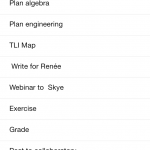Exactly four years ago today, I published Spontaneous Professional Development, a brief post describing four cases demonstrating that, “Much of my most valuable professional development came out of nowhere, was free, and lasted minutes – or even seconds. All I had to do is pay attention.”
This semester, I’ve stumbled into one more Spontaneous PD, having to do with class management in general and building relationships with students in particular.
It started in second period a few weeks ago. Three girls (call them Josi, Becca, and Lupita) were visiting too much. When I corrected them, they claimed they were working. I contradicted them, and in a New York Minute, they ganged together and pushed back with age-typical fury.
So, I called each of them individually into the breezeway to call home. Josi was como agua por chocolate, insisting to her mother that she hadn’t done anything wrong. The mother supported me completely. I didn’t want her to go back with her friends, so I sent her to one of my “buddy” teachers for the rest the period. Becca was also boiling when I called her into the breezeway. No one picked up at home, and I sent her to another buddy, too.
Lupita, on the other hand, told me she had a bad temper like her father and was trying to learn to manage it better. She owned her role in the disruption and apologized. I let her go back into class.
In order to prevent things from carrying over to the next day, I knew I had to make peace with the Josi and Becca. Joni actually started the process and made it easier by sending me a note apologizing for her behavior. I decided to speak to Josi and Becca individually in my planning period.
I went to see Becca first. As I walked to her class, I rehearsed the usual “restorative” approach I would take – acknowledging her anger but explaining my point. It might have gone ok, but I didn’t think it would. I entered her class and asked the teacher if I could see Becca for a moment. I still didn’t know what to say, but when we got into the hallway, I did realize what I most needed for our student-teacher relationship and for the rest of the class, and so I put it directly, “Becca, I don’t want you to be mad at me.”
First Becca did a double-take, then squinted her eyes, then took a step back. Then she gave me a big smile as she said, “Oh, Mr. Merz, don’t worry, everything’s cool.” That gave me a chance to explain that when it’s three against one, I have to exercise my authority more aggressively than I’d prefer. She said she got it and we separated with a fist bump.
When I saw Josi, I thanked her for the note and told her I had called her mom again and told her about the apology. Then I told her, too, that I didn’t want her being mad at me. Like Becca, Josi’s body language expressed surprise, and she said we were going to be fine and that she’s really not like she behaved. (She’s really not.)
Since that day, Josi, Becca, and Lupita have been great, and the few times they’ve drifted from the straight and narrow, they’ve accepted correction without rancor.
On Thursday I had another chance to test my new conversation starter. Normally, when students work independently, I let them listen to their devices. It’s a way to meet classes halfway – they’ll get something they want if they give me something in return – in this case, civil language. But on Thursday, one of the boys, I wasn’t sure who, dropped the V-bomb (a particularly coarse Spanish slang word.)
I immediately told everyone to put their devices away. They all pushed back, “I didn’t say anything!” I gave them the routine about we rise or sink together. They grumbled, a lot, but they complied. I wasn’t too worried about things carrying forward, but I knew a lot depended on how “Francisco,” who was particularly mad and is also the natural leader of the class, came in the next day.
So, near the end of class I called him over and tried my line, “Francisco, I don’t want you to be mad at me.” Like the girls, he was clearly surprised at what I had said and replied, “Nah, nah, Mr. Merz. It’s all good.”
Now I can imagine someone saying teachers shouldn’t try to be students’ friends, that that undermines our authority. Or similarly, that apologizing for exercising my authority sends the message that I’m weak and solicitous.
Both those arguments are wrong. In the first case, I think students measure the legitimacy of our authority by how little we have to exercise it to manage a class. One way to minimize the need to crack down is to minimize anger – and expressing my desire for these students not to be angry with me defused any that they might have been stewing.
In the second case: I never apologized and gave no indication that I wouldn’t be strict, make home contacts, or limit device use in the future if their behavior led me to that decision.
I’ll have to try, ”I don’t want you to be mad at me,” more, and in different situations, but early indicators suggest it’s a keeper – and one heck of a Spontaneous Profession Development.
__________
For more of my approach to classroom management, please check out:
My Last Ditch Classroom Management Tactic: The Silent Rant
The Only Class Rule You’ll Ever Need
The Sweet Spot of Shared Responsibility
Arguing with Students: It’s All About the Toothpaste
Trading Good Behavior for Bad Behavior
School Discipline: The Story Behind the Referral
Punishments, Consequences, or Something New?









Comments 6
What an interesting read! As a somewhat-recent high school graduate myself, the teachers that garnered the most respect from students were the ones who were not afraid to level with us when tensions were high.
As you mentioned in your post, students measure a teacher’s legitimacy or authority by how little they have to exercise it for classroom management – this is is 100% spot on in my experience. Teachers who ware combative, short tempered, and quick to punish do not create the type of environment that most students thrive in. Hostility is not a good foundation for learning!
Great post.
Thanks very much kbuffett. You’ve inspired my next post, which I’ll dedicate to legitimate authority at all levels of education. It’s partly based on Malcolm Gladwell’s book, David and Goliath. I’ll post it Saturday.
The greatest thing about your discovery is that it came completely from you, your experiences and your gut. Even if you had received this tip from a workshop, I guarantee that it will be more effective for you because you are able to own it and it sprang from a specific moment and a specific need.
Thanks for sharing Sandy. Love when we learn from what we do everyday in the classroom. Looking forward to your next post related to the legitimate authority at all levels of education.
Sandy, this is brilliant. The end game isn’t “getting even,” it’s getting them to comply and perform. As far as I’m concerned, the results are a “mic drop,” on those who would criticize the approach. We can spend forever trying to exert our authority in a way that we believe has them reciprocating with pseudo-respect, but quite often those that criticize lost the litmus test with some regularity. The fact that those students didn’t end up in a hallway or waiting for admin, while missing your teaching says it all. The proof is in the pudding! Good job!
Mr. Merz… who can ever stay mad at you?! I still remember my days with you, and I talk about you to my kids and my students all the time. You were inspiring when I was a kid, and you continue to be now that I am an adult. It is so nice to stumble upon your greatness once again.
Love,
Brenda (Paty) Lopez
Safford Middle School 1994-1997